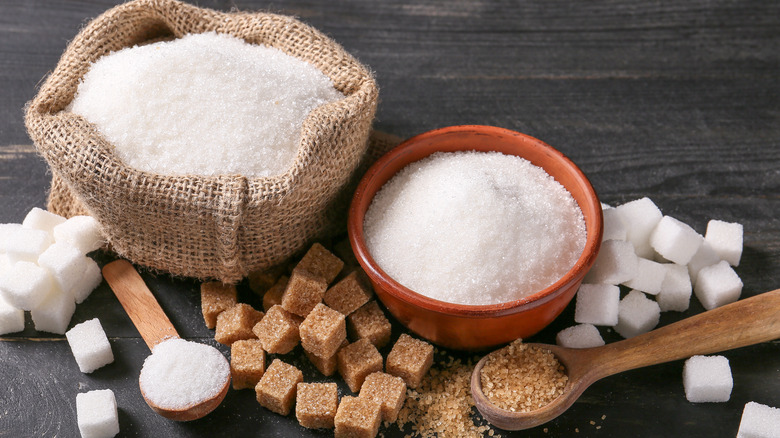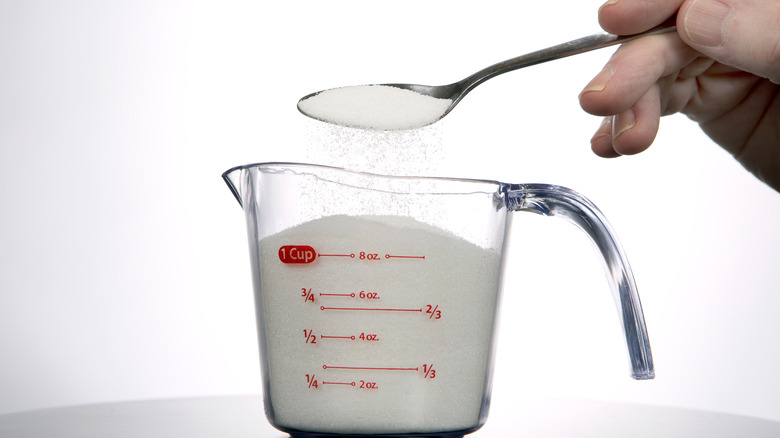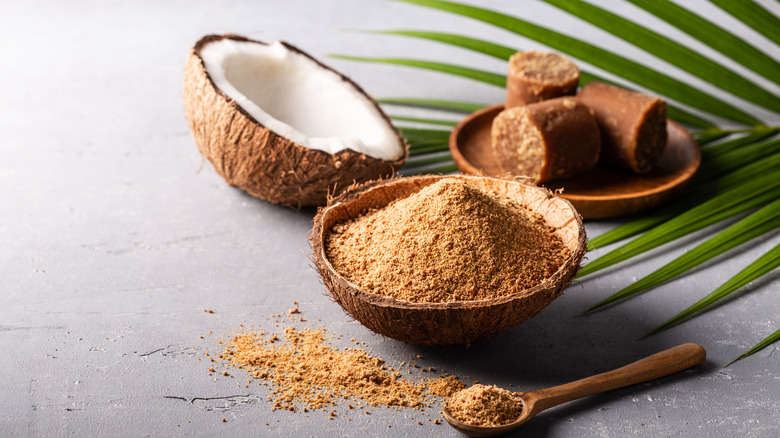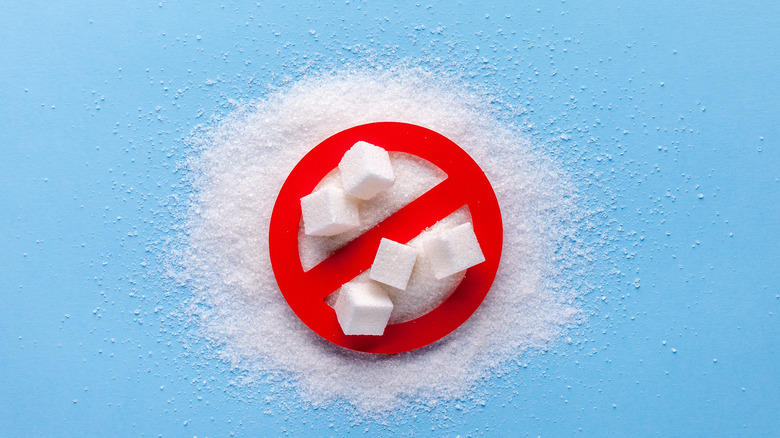Coconut Sugar Vs Cane Sugar: What's The Difference?
Whether we like to admit it or not, sugar is pretty darn delicious. It has a sweet, pleasing flavor that makes everything from our favorite desserts to our favorite Starbucks coffee drinks taste that much better. A good deal of our sugar intake probably comes from regular old cane sugar. Perhaps the most common type of sugar, cane sugar is most commonly called for in dessert recipes or left on the table at restaurants for adding to our coffee. According to sugar.org, cane sugar is made by harvesting sugar cane stalks and extracting the juices, which are then concentrated, refined, filtered, and finally crystallized into the granulated sugar we use in our everyday life.
But — much like our favorite Starbucks orders — there are many ways to customize our sugar intake, as more and more cane sugar substitutes have been popping up in recent years. One common alternative is coconut sugar, which has gathered a fair amount of attention because it comes from plants, rather than being made with synthetic, artificial ingredients like aspartame, saccharin, or sucralose. Instead, coconut sugar is made by extracting coconut palm sap from a coconut tree, mixing it with water, boiling the mixture, and letting it dry and crystallize, according to Well and Good.
Coconut and cane sugar have a similar sweet taste
For all practical purposes, coconut sugar and cane sugar can be treated pretty much the same. They are both pleasing, flavorful sweeteners that can be used in just about any dish or dessert. Cane sugar is known for its highly sweet flavor profile, and is characterized by a notably sweet aftertaste and a slightly fruity aroma, according to J Food Sci. Because of its texture, cane sugar also tends to caramelize very well, so many people prefer to use it as an ingredient in dishes that require caramelized sugar, such as flans, candies, or sweet sauces, according to Healthline.
Despite its name, coconut sugar does not taste like its namesake fruit. Coconut sugar is also pleasantly sweet, but it has a slightly more mild, subtle flavor with a hint of caramel. Its flavor and color are most commonly likened to brown sugar. While it likely won't change the flavor of food too much, using coconut sugar instead of cane sugar may change the color and appearance of what you're making because coconut sugar is darker in color, Well and Good notes.
Coconut sugar is an effective substitute for cane sugar
Coconut sugar works as a substitute for regular cane sugar in just about any recipe. Because coconut and cane sugars are both similarly sweet, they can be used in place of the other when cooking or baking without requiring very many adjustments. They both have very similar granulated textures, which makes substituting one for the other even easier. When substituting coconut sugar for cane sugar in a recipe (or the other way around), you can generally use the same amount that the recipe calls for.
However, as registered dietician Carissa Galloway told Well and Good, you should "keep an even closer eye than usual on the oven or stove," as there may be slight differences in factors like cooking time and texture. So while there may be a small amount of experimentation involved, coconut sugar and cane sugar can be swapped out for each other fairly easily.
Too much sugar of any kind can be harmful to one's health
Sugar can be found in almost everything, from the sweet cakes and pies that you would expect to more surprising sources like savory marinara sauces, ready-made meals, alcoholic beverages, and even ketchup. In recent years, people have become increasingly aware of the risks that come from consuming too much sugar. Sugar has been linked to quite a few negative health effects, including an increased risk of developing chronic health problems like high blood pressure, high blood sugar, and even cancer. It is also one of the major factors that contributes to weight gain and obesity, which has been shown to raise the risk of developing other health conditions, including type 2 diabetes, heart disease, and stroke, according to Harvard Health Publishing.
"The effects of added sugar intake — higher blood pressure, inflammation, weight gain, diabetes, and fatty liver disease — are all linked to an increased risk for heart attack and stroke," Dr. Frank Hu, professor of nutrition at the Harvard T.H. Chan School of Public Health, told Harvard Health Publishing, adding that "the higher the intake of added sugar, the higher the risk for heart disease." As a result, many people have started to seek out healthier, low-calorie alternatives to regular sugar. But is coconut sugar one of those healthier, all-natural sugar substitutes? Unfortunately, the answer appears to be no.
Coconut sugar contains a very small amount of nutrients
Although it is made from a fruit, that doesn't mean coconut sugar is necessarily a health food. Coconut sugar and cane sugar contain about the same amount of calories and carbohydrates, at around 15 calories and four grams of carbs per one teaspoon serving, according to Dr. Weil.
However, coconut sugar does have some nutritional properties. "Coconut sugar has small amounts of iron, zinc, calcium, potassium, and short chain fatty acids," registered dietitian Carissa Galloway explained to Well and Good. It also contains some fiber and antioxidants, so while it is not completely devoid of nutrients, coconut sugar cannot not really be considered nutritious in any practical way. The nutrition content is so small, and the calories are so high, that one would have to eat an obscenely large amount to receive any significant nutrients, and any health benefits would almost surely be offset by the high amounts of calories and sugar that one would have to consume.
People with diabetes should limit consumption of both sugars
For this reason, coconut sugar is also not necessarily a safer substitute for people who are diabetic or pre-diabetic. According to Healthline, doctors recommend treating coconut sugar the same as one would regular sugar, since it has a comparable amount of calories and carbohydrates and its glycemic index is around 50 – 54, which is about the same as cane sugar. At the end of that day, coconut sugar is still sugar. Coconut sugar will likely affect a diabetic person's blood sugar levels in similar ways to other types of sugar. Although it can be used as a cane sugar substitute, diabetics should treat it as a one-to-one substitute and their intake of coconut sugar should also be monitored and limited.
So while coconut sugar can be a useful sugar substitute, it is important to keep in mind that no sugar is really "healthy." Unfortunately, science has not yet found a way to make a sweet and delicious, yet still completely healthy, sugar substitute. So although both cane and coconut sugar can make for a great treat, it is probably best if they're enjoyed in moderation.





